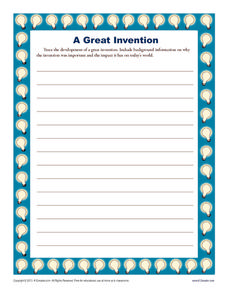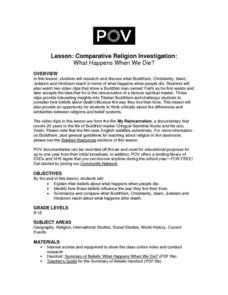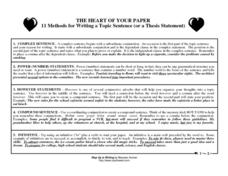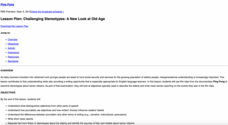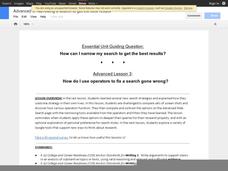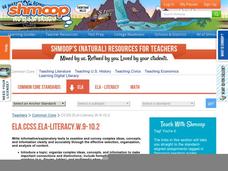Curated OER
Nuclear Chemistry Project
Radiation has numerous real-world applications, some of which are relatively safe while others can be extremely hazardous. In this nuclear chemistry project, young scientists choose a practical use of nuclear reactions to research in...
Indian River State College
Argumentative (Persuasive) Essay Guidelines
Here is a handout that outlines six great steps to structuring an argumentative essay, which can be continually referenced as you teach your class about persuasive writing.
K12 Reader
A Great Invention
Try out a writing prompt that is great for a warm-up or an in-depth research project! Have kids describe an important invention and trace its development over the years. Use the writing prompt in a language arts class, social studies...
The New York Times
Making Do: Learning and Growing Through Adversity
What is it that makes people keep going when they face challenges in life? Ask your class to consider this question in relation to their own experiences and as they read material from The New York Times. Using personal experiences and...
The New York Times
News and News Analysis: Navigating Fact and Opinion in the Times
Help your class understand the difference between fact and opinion by exploring the New York Times homepage and articles. In pairs or small groups, pupils complete a scavenger hunt, answering the provided questions. Next, discuss the...
The New York Times
Decision Point: Understanding the U.S.’s Dilemma Over North Korea
Simulate the Situation Room and analyze the US's relationship with North Korea. The plan starts off with a quick review and an examination of a online timeline that updates as the situation continues. Next, the class reads an article and...
American Documentary
Comparative Religion Investigation: What Happens When We Die?
How do different religions offer explanations for what happens when we die? Invite your learners to consider the variance and complexity of religious beliefs, and to research and compare/contrast the concept of death and afterlife...
The New York Times
Looking for Answers: Making Sense of the Boston Marathon Bombing
How should America respond to acts of domestic terrorism? What motivates or prompts a terrorist attack? After reading an opinion piece on the 2013 Boston Marathon bombing, your learners will critically analyze factors that could have...
Curated OER
The Heart of Your Paper: 11 Methods for Writing a Topic Sentence (or a Thesis Statement)
Help your young writers produce high-quality topic and thesis statements that go beyond basic wording and really illustrate complex ideas and critical thinking skills. From however and compound sentence statements to using rhetorical...
Curated OER
The Writer’s Toolbox: What You Need to Master the Craft
All the tools (and directions) you’ll need to build an essay are included in a resource designed for learners and educators. The packet can be given to class members or divided into sections and used as part of a series of lesson on the...
Curated OER
Race and Crime in the United States: Are We Victims of Discrimination or Antiheroes?
Using methods adopted by Public Policy Analysts (PPA) class groups define a social problem, gather evidence to document the existence of the problem, identify causes, evaluate existing policies designed to deal with the problem, develop...
Curated OER
Challenging Stereotypes: A New Look at Old Age
Combine a lesson on the elderly with grammar instruction. Before viewing a series of provided video clips, class members brainstorm a list of words related to senior citizens and organize these words into categories that correspond with...
Random House
Teacher's Guide: The Hobbit: The Enchanting Prelude to Lord of the Rings
The Odyssey, Star Wars, The Hunger Games. Odysseus, Luke Skywalker, Katniss Everdeen. Add The Hobbit and Bilbo Baggins to these lists, and you have a unit examining classic and contemporary myths, legends, and folktales with hero and...
Google
Beginner & Intermediate 5: Evaluating Credibility of Sources
Convey how to determine appropriate and credible online sources with a series of three lessons. After completing the lessons, class members will know what kinds of sources to use, how to identify credible sources, and how tone and style...
Google
Advanced 5: Evaluating Credibility of Sources
How do discerning readers determine bias and credibility? Ask small groups to figure it out! First, each group is provided with either articles or videos that contain bias. They examine the resources, respond to included questions, and...
Google
Advanced 4: Searching for Evidence for Research Tasks
Research was very different in the past. Pupils once had difficulty finding sufficient information, but now they have the opposite problem. Show your class how to pick the best resources out of the millions of sites an online search will...
Google
Advanced 2: Understanding Search Results
Effective researchers use a variety of techniques to find what they need online. Pupils who complete the activities listed here should already have an arsenal of strategies for searching. They will learn about and practice two new...
Google
Advanced 3: Narrowing a Search to Get the Best Results
Familiarize your class with Google operators, specific symbols, or words they can use to express more clearly to the search tool what they want to find. With the resources included here, they can test their previous knowledge, view...
Shmoop
ELA.CCSS.ELA-Literacy.W.9-10.2
The details in the new Common Core standard for producing informative/explanatory texts is different from what you have in your current curriculum, and now you are confused on what to do. Keep calm and carry on, because not only does...
Curated OER
Social Studies: Essay Outline
Here is a resource intended for a social studies class, but great no matter the subject. It's a complete outline for an essay. It includes space to write ideas related to the thesis, supporting details, transition sentences and words,...
Curated OER
Further Improvements of Writing Skills
Improve writing skills by finding a personal writing style, using descriptive language effectively, and using precise language. Middle schoolers discuss individual style in writing and formal and informal language. They utilize figures...
Curated OER
Formal versus Informal Language
Engage in an activity that focuses on the concepts of formal and informal language use. Middle and high schoolers compare and contrast each style by using a Venn diagram that includes some examples. They read and hear a passage of lyrics...
Curated OER
Beginning Your Inquiry
If you're starting a research project, use this guide to help young learners form the inquiry for their research. With steps that outline the entire process, including note taking and gauging the quality of an inquiry question, this...
Curated OER
About Life: The Photographs of Dorothea Lange Going to the Promised Land
To better understand the migrant experience during the Great Depression, pupils analyze two primary resources: photographs by Dorothea Lange and a U.S. Map that shows the Dust Bowl. They compare and contrast Lange's images to Steinbeck's...




